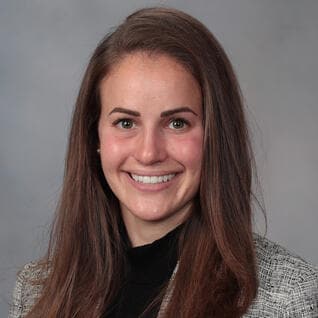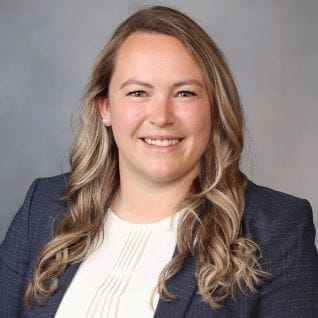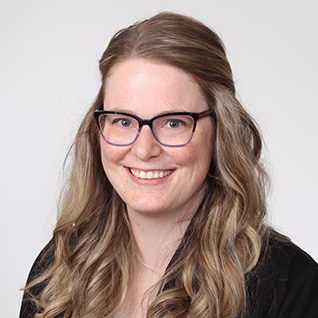Meet our Fellows
/prod01/channel_2/media/mccms/content-assets/academics/residencies-and-fellowships/neonatal-perinatal-medicine-fellowship-minnesota/neo-peri-med-mn-fellows-1024X512.jpg)
Our fellows and faculty foster a collegial environment and education-focused culture that provides an inclusive learning experience. Training can be challenging, but our program is close-knit and each fellow brings a dedication to providing stellar patient care as well as a collaborative learning experience.
Our fellows come from medical schools around the U.S. and outside the country. Learn more about our current fellows and see what they have to say about the program:
Wentiirim Annankra, M.D.
 Hometown: Fumbisi, Upper East Region, Ghana
Hometown: Fumbisi, Upper East Region, Ghana
Professional vision: My hope is to be a clinician educator and neonatologist with a particular focus on global newborn care including low-middle-income countries and Sub-Saharan Africa.
What attracted you to Mayo Clinic? The unique focus on education, the exceptionally supportive nature of faculty, the NICU care team, and the focus on patient-centered care.
Now that you are a fellow here, what would you recommend to others about this program? This program really cares about your growth and development into a world-class clinician. They focus on helping the fellow achieve their individual career goals, no matter what it may be. I constantly marvel at the level of mentorship, leadership, and guidance I continue to receive on a daily basis.
Whitney Thompson, M.D.
 Hometown: Rochester, MN
Hometown: Rochester, MN
Professional vision: I aspire to be a clinician investigator in the integrated diagnosis, management, and discovery of neonatal genetic disease.
What attracted you to Mayo Clinic? Mayo emphasizes the value of personalized medicine in providing the best possible care for each patient, which aligns with my interests in genomic medicine and individualized care for critically ill neonates.
Now that you are a fellow here, what would you recommend to others about this program? Incredible mentorship and education curriculum, flexibility to pursue and integrate additional interests with the fellowship for a personalized experience.
Kayla Munger, M.D.
 Hometown: Vermillion, SD
Hometown: Vermillion, SD
Professional vision: My vision is to become an excellent clinical neonatologist as well as a leader within graduate medical education.
What attracted you to Mayo Clinic? I originally came to Mayo for residency because it was clear that it was an inclusive, supportive place to work and learn. Mayo is truly amazing at supporting individual learners in their own career paths because of the vast amounts of resources and opportunities available here.
Now that you are a fellow here, what would you recommend to others about this program? I chose to stay here for fellowship because I found amazing mentors who I knew would help guide me throughout my next three years and beyond, and because all the amazing educators here in our NICUs.
Katelyn Johnson Wegerson, M.D.
 Hometown: Hazen, ND
Hometown: Hazen, ND
What attracted you to Mayo Clinic? Having grown up in the Midwest, Mayo Clinic has always been a dream workplace for me. Furthermore, I continue to be inspired by Mayo Clinic’s unwavering dedication to patient-centered care, combined with the commitment to innovation and research
Now that you are a fellow here, what would you recommend to others about this program? I prioritize collaboration and a positive working environment which is evident from all my interactions with the fellows and faculty. Additionally, there is a clear priority placed on working with fellows to reach their specific research goals while promoting career and professional development.
Research by past and current fellows
- Uncertainty at the limits of viability
- Interventions to prevent ROP: A meta-analysis
- Remote video neonatal consultation as a system to improve neonatal quality, safety, and efficiency
- Developing a newborn resuscitation telemedicine program
- Development and evaluation of a flipped classroom pilot in neonatal mechanical ventilation
- Universal electrocardiographic screening for long QT syndrome in hospitalized neonates
- Survival of ventilated extremely premature neonates with severe IVH
- Training fellows in neonatal tele-resuscitation using a simulation-based mastery learning model
- Implicit bias training in health professions education: A scoping review
- Consensus on an implicit bias and health disparities curriculum in neonatal medicine
- Development and evaluation of an online program for bubble CPAP education in resource-constrained settings
- Proposed plasma ammonia reference intervals in a reference group of hospitalized term and preterm neonates
- Red blood cell transfusion-related acute lung injury in premature infants
- Association of early inhaled nitric oxide with the survival of preterm neonates with pulmonary hypoplasia
- Size and age-specific outcomes of inhaled nitric oxide in preterm neonates with clinically diagnosed pulmonary hypertension
- Off-label use of inhaled nitric oxide after release of NIH consensus statement
- ADHD and learning disabilities in former late preterm infants
- Clinical applications of ultra-rapid whole genome sequencing (in progress)
Quality improvement projects led by past and current fellows
- Reducing necrotizing enterocolitis in high-risk neonates
- Reducing opioid exposure in a Level IV neonatal intensive care unit
- Reducing alarm fatigue in the NICU
- Improving infant vaccination status in a Level IV neonatal intensive care unit
- Improving the timeliness and efficiency of discharge from the NICU
- Using video laryngoscopy to improve first-time intubation success rates in the NICU (in progress)